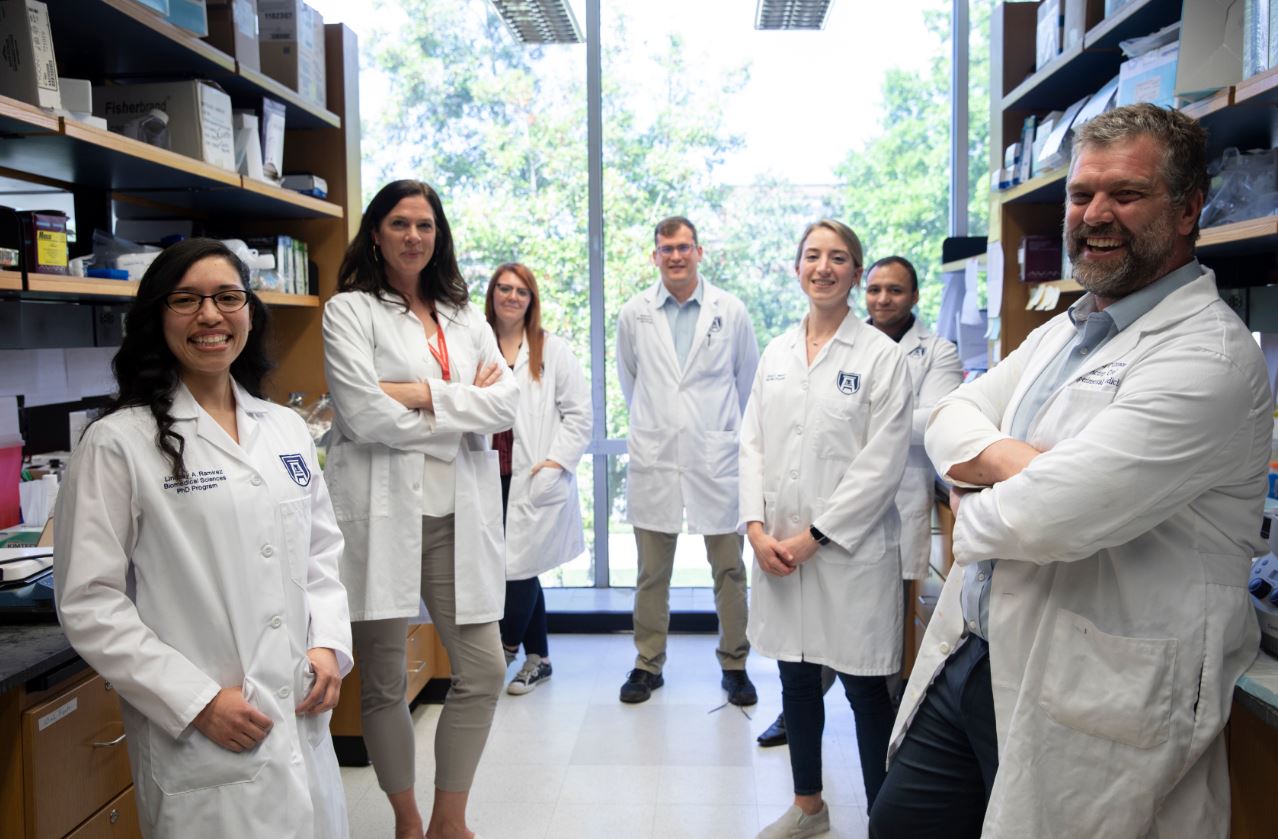
Jennifer Sullivan
Professor

Lab Team
Jeaninie Badrak
- Lab Manager
- Assistant Research Scientist
Hannah Godley
- Graduate Student
Cameron Liss
- Medical Student
Emma Gomez Lopez
- Undergraduate Student
Phone: (706) 721-9796
Fax: (706) 721-7299
Email: jensullivan@augusta.edu
Office: CB-2204
Lab: CB-2210



Jump to: Education & TrainingAcademic AppointmentsResearch InterestsCurrent ProjectsAwards & AccomplishmentsRelated Links
Education & Training
Academic Appointments
2021-present Dean, The Graduate School, Augusta University
2018-present Professor, Department of Physiology, Augusta University
2014-2018 Associate Professor, Department of Physiology, Augusta University
2013-2014 Associate Professor, Department of Medicine, Georgia Regents University
2011-2013 Assistant Professor, Department of Medicine, Georgia Health Sciences University
2011-present Associate member of the Department of Pharmacology and Associate member of the Vascular Biology Center
2008-2011 Assistant Professor, Vascular Biology Center, Medical College of Georgia
2006-2008 Instructor, Department of Pharmacology and Toxicology, Medical College of Georgia
2003-2006 Assistant Research Scientist, Department of Pharmacology and Toxicology, Medical College of Georgia
Research Interests
The overall goals of my laboratory are to 1) better understand the molecular mechanisms that regulate blood pressure (BP) and renal health and function in males and females under both physiological and pathophysiological conditions, and 2) increase our understanding of conditions which predispose females to cardiovascular and renal disease. ~19 million deaths were attributed to cardiovascular disease (CVD) globally in 2020, an increase of ~20% from 2010; heart disease remains the leading cause of death for men and women in the US. Hypertension is a major modifiable risk factor for CVD, and it has been suggested that eliminating hypertension would reduce CVD mortality by 30.4% in men and 38.0% in women. Although young women are considered “protected” from hypertension and the associated cardiovascular risk relative to age-matched men, the elimination of hypertension is projected to have a larger impact on CVD mortality in women. Studies in the lab are designed, in part, to increase our understanding of the mechanisms controlling blood pressure in both sexes, to allow for the development of more targeted and effective medications to treat hypertension.
Current Projects
- Improving awareness of women with hypertension: ROAR (Rural, Obese, At Risk) 1U54HL169191-01: The overall goal of the project is to make ROAR a national resource, recognized leader in CVD in females, and a force to change perceptions and awareness surrounding CVD risk in women across the Southeast, particularity in high-risk groups of women. The projects includes three scientific projects and a career enhancement core. The three research projects include Dr. Sullivan’s project on the enhanced susceptibility of females to high fat diet-induces increases in blood pressure, a project examining the interaction of immune system activation and obesity of systemic lupus erythematosus (SLE) hypertension in females led by Erin Taylor, PhD, at the University of Mississippi Medical Center, and a third project examining how immune cells are activated in SLE led by Michael Ryan, PhD, at the University of South Carolina’s School of Medicine. For more information on this funding mechanism, visit: Office of Research on Women’s Health.
- Mechanisms of subclinical renal injury in females following AKI: implications for adverse pregnancy outcomes (1R01DK134695): Acute kidney injury (AKI) is a major clinical problem in the United States. AKI occurs in ~1 in 5 hospitalizations and women make up ~40% of AKI patients. Patients of both sexes who recover from AKI are at risk for developing chronic kidney disease and cardiovascular events and have increased all-cause mortality, suggesting that subclinical kidney injury persists following AKI. Recent large-scale clinical studies report that women with a history of AKI have abnormally high rates of adverse maternal and fetal outcomes during pregnancy, despite clinical evidence of renal recovery prior to conception as defined by measurement of serum creatinine. We recently established a pregnancy post-AKI model in Sprague Dawley rats using ischemia reperfusion (IR) as an experimental model of AKI, allowing us to examine the mechanisms by which AKI prior to conception prevents appropriate adaptions to pregnancy. Current studies are designed to test the hypothesis is that AKI prior to conception impairs the renal, hemodynamic and immune adaptations required for a healthy pregnancy by decreasing nitric oxide (NO) bioavailability.
- Females have more anti-inflammatory, anti-hypertensive Tregs than males: We have reported that greater numbers of T regulatory cells (Tregs) in females are critical to the ability of females to limit increases in BP relative to males, suggesting a central role for immune cells in contributing to sex differences in BP and the cardiovascular “protection” typically afforded to young females. Ongoing work in the lab is further examining why females have more Tregs than males. Understanding the mechanisms regulating immune cell recruitment could provide novel insight into how males vs. females regulate the T cell profile in key organs responsible for BP control.
- Females recover from AKI faster than males: The prognosis of patients with AKI remains poor, and patients that recover from AKI are at increased risk for developing chronic kidney disease, cardiovascular events and all-cause mortality. Clinical and pre-clinical studies further indicate that the male gender is a risk factor for the incidence and severity of AKI. In particular, we are interested in the relative mechanisms driving recovery in males vs females. The degree of injury immediately following an ischemic insult is relatively comparable between the sexes, but females tend to recover renal function faster than males. Ongoing studies are examining the physiological implications of our observations that 1) males have prolonged vascular congestion in the renal medulla compared to females and 2) males exhibit sustained mitochondrial dysfunction following ischemia.
Awards & Accomplishments
Medical College of Georgia Group on Women in Medicine and Science (GWIMS) Leadership Award
- 2023
Outstanding Faculty Award in Support of First-Year PhD Students, The Graduate
- 2023
Inducted into Phi Kappa Phi
- 2023
Ernest Starling Lectureship Award, APS WEH Section
- 2023
Recipient of the 2021 AURI (Augusta University Research Institute) Distinguished Research Award
- 2022
Named Dean of The Graduate School
- 2021
Selected as an “MCG Woman Who Inspires”, AU
- 2021
Distinguished Service Award, the Graduate School, AU
- 2021
Past Accomplishments
By Year
2018
- Augusta University “Caught in the Act of Great Teaching” Award recipient
- Mid-Career Awardee - Hypertension Council
2017
- American Journal of Hypertension's John Laragh Research Award
- Augusta University Faculty Senate Outstanding Faculty Award from The Graduate School
2016
- Augusta University Authentic Women Leaders Pilot Pipeline Program
- American Journal of Physiology - Regulatory, Comparative and Integrative Physiology Star Reviewer
2015
- Chair, APS Sex and Gender-Related Research Interest Group
2014
- Named the 2015 APS Renal Section Young Investigator
2013
- Selected as Associate Editor for AJP:Renal Physiology
- Selected as Cardiorenal Study Section Co-Chair; American Heart Association
- Named Chair of the Augusta University Women’s Health Research Interest Group in the Div. of Clinical Translational Science
2011
- Recipient of GHSU Outstanding Young Basic Science Faculty Award
- Recipient of GHSU Research Institute Emerging Scientist Award
2010
- Named Fellow of the American Heart Association and the Council for High Blood Pressure Research
2008
- Recipient of Kidney Council New Investigator Travel Award
2007
- Recipient of Consortium for Southeastern Hypertension Control Arthur Guyton New Investigator
Award
- Named the APS Water and Electrolyte Homeostasis Section New Investigator
2006
- Recipient of Merck New Investigator Award
Representative Publications
|
Tipton AJ, Musall JB, Crislip GR, Sullivan JC. Greater transforming growth factor-β in adult female SHR is dependent on blood pressure, but does not account for sex differences in renal T regulatory cells. Am J Physiol Renal Physiol, 2017, Epub ahead of print. DOI: 10.1152/ajprenal.00175.2017 |
|
Gillis EE and Sullivan JC. Sex Differences in Hypertension: Recent Advances. Hypertension, 68(6):1322-1327 2016. DOI: 10.1161/HYPERTENSIONAHA.116. 06602 |
|
Taylor L and Sullivan JC. Sex Differences in Obesity-Induced Hypertension and Vascular Dysfunction: A Protective Role for Estrogen in Adipose Tissue Inflammation? Am J Physiol Regu, 2016, Epub ahead of print. DOI: 10.1152/ajpregu.00202.2016 |
|
Sasser JM, Brinson KN, Tipton AJ, Crislip GR and Sullivan JC. Blood pressure, sex and female sex hormones influence renal inner medullary nitric oxide synthase activity and expression in Spontaneously Hypertensive Rats. J Am Heart Association. 4(4); pii: e0017382015, 2015. DOI: 10.1161/JAHA.114.001738 |
|
Tipton AJ, Baban B, Sullivan JC. Female SHR Have a Compensatory Increase in Renal Regulatory T Cells in Response to Elevations in Blood Pressure. Hypertension, 64(3):557-64; 2014. DOI: 10.1161/HYPERTENSIONAHA.114.03512 |
Related Links
- McIndoe to lead $6.2 million innovative research initiative (JagWire)
- NIH training grant enhances opportunities for biomedical graduate students at AU (EurekAlert!)
- New rodent model helps identify pregnant women whose prior kidney injury also affects babies (News Medical Life Sciences)
- Females use anti-inflammatory T cells to keep their blood pressure down (MedicalXpress)
- High-fat diets appear bad for blood pressure in younger males and females (ScienceDaily)
- Research shows high-fat diets are bad for blood pressure, even in young people (News Channel 6 WJBF)
- Fall 2018 Caught in the Act of Great Teaching award winners announced (JagWire)
- High oxidative stress hampers males' production of powerful blood vessel dilator (EurekAlert!)
- Sullivan selected for two national scientific honors (EurekAlert!)
- The American Journal of Hypertension announces the John Laragh Research Award Recipient for 2017: Jennifer C. Sullivan, PhD
- Beyond Capacity (MCG Medicine)
- Search for better hypertension treatment for females starts with high-salt diet (JagWire)
- $9.4 million grant helps scientists explore how cell death fuels high blood pressure (JagWire)
- Segment One Dr. Jennifer Sullivan, Heart health, Couple married for 80 years (News Channel 6 WJBF)
- “Danger” molecule may be new therapeutic target for male hypertension (JagWire)
- Cause of gender differences in blood pressure, kidney damage under study (Eurekalert)
